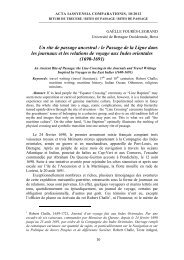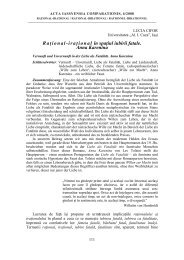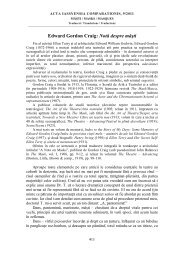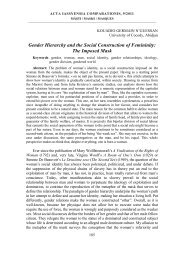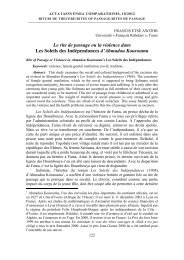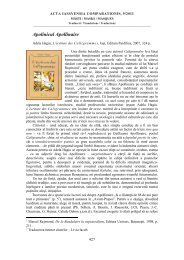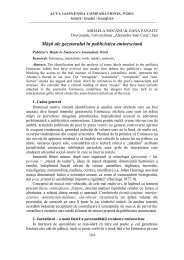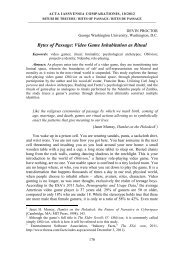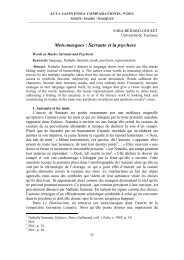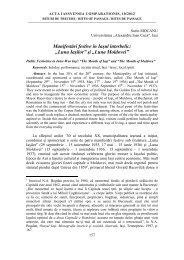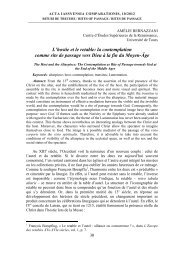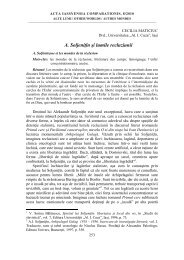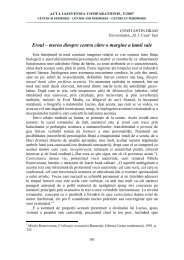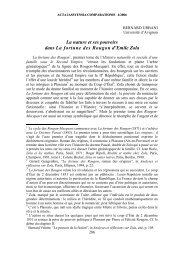Foreign Home and Familiar Abroad in Salman Rushdie's The ...
Foreign Home and Familiar Abroad in Salman Rushdie's The ...
Foreign Home and Familiar Abroad in Salman Rushdie's The ...
Create successful ePaper yourself
Turn your PDF publications into a flip-book with our unique Google optimized e-Paper software.
ACTA IASSYENSIA COMPARATIONIS, 8/2010<br />
ALTE LUMI / OTHER WORLDS / AUTRES MONDES<br />
________________________________________________________________________________<br />
“After the accident, he said, the surviv<strong>in</strong>g passengers swam to the shore (the tra<strong>in</strong><br />
had plunged off a bridge) <strong>and</strong> were met by local villagers, who pushed them under<br />
the water until they drowned <strong>and</strong> then looted their bodies.” (55)<br />
Acknowledg<strong>in</strong>g, formulat<strong>in</strong>g <strong>and</strong> assum<strong>in</strong>g their national identity prove<br />
problematic for Rushdie’s India citizens. Only by successfully achiev<strong>in</strong>g these can<br />
India claim its status as a civilized place; it is by means of orient<strong>in</strong>g towards itself<br />
<strong>and</strong> assum<strong>in</strong>g its gestures, however cruel they might be, that India could def<strong>in</strong>e<br />
itself as different from the other nations: “ ‘We always forgive ourselves by<br />
blam<strong>in</strong>g outsiders, America, Pakistan, any damn place. Excuse me, George, but for<br />
me it all goes back to Assam, we have to start with that.’ <strong>The</strong> massacre of the<br />
<strong>in</strong>nocents. Photographs of children’s corpses, arranged neatly <strong>in</strong> l<strong>in</strong>e like soldiers<br />
on parade. <strong>The</strong>y had been clubbed to death, pelted with stones, their necks cut <strong>in</strong><br />
half by knives. Those neat ranks of death, Chamcha remembered. As if only horror<br />
could st<strong>in</strong>g India <strong>in</strong>to orderl<strong>in</strong>ess. (…) ‘We are all guilty of Assam,’ he [Bhupen]<br />
said. ‘Each person of us. Unless <strong>and</strong> until we face it, that the children’s deaths were<br />
our fault, we cannot call ourselves a civilized people.’”(56)<br />
Bombay represents a culture of duplicates, imitations, the success models from<br />
beyond borders be<strong>in</strong>g dreamt of <strong>and</strong> unmediatedly transposed locally. It is not only<br />
architecture works but also values <strong>and</strong> behaviours that are imitated: “Bombay was a<br />
culture of re-makes. Its architecture mimicked the skyscrapers, its c<strong>in</strong>ema endlessly<br />
re-<strong>in</strong>vented <strong>The</strong> Magnificent Seven <strong>and</strong> Love Story (…). Its millionaires, too, had<br />
taken to import<strong>in</strong>g their lives.” (64)<br />
<strong>The</strong> reality of Bombay is one under construction, <strong>in</strong> the process of self-def<strong>in</strong><strong>in</strong>g,<br />
a process <strong>in</strong> which Salad<strong>in</strong> is <strong>in</strong>volved as well, on a different trajectory, though. <strong>The</strong><br />
image of Bombay when he leaves it illustrates this hypostasis: “<strong>The</strong> aeroplane lifted<br />
<strong>and</strong> banked over the city. Somewhere below him, his father was dress<strong>in</strong>g up a servant<br />
as his dead wife. <strong>The</strong> new traffic scheme had jammed the city centre solid. Politicians<br />
were try<strong>in</strong>g to build careers by go<strong>in</strong>g on padyatras, pilgrimages on foot across the<br />
country. <strong>The</strong>re were graffiti that read: Advice to politicos. Only step to take: padyatra<br />
to hell. Or, sometimes: to Assam. Actors were gett<strong>in</strong>g mixed up <strong>in</strong> politics. (…)<br />
Salad<strong>in</strong> Chamcha, on Flight 420, closed his eyes; <strong>and</strong> felt, with deep relief, the telltale<br />
shift<strong>in</strong>gs <strong>and</strong> settl<strong>in</strong>gs <strong>in</strong> his throat which <strong>in</strong>dicated that his voice had begun of its<br />
own accord to revert to its reliable, English self.” (73)<br />
<strong>The</strong> hypostases of India depicted <strong>in</strong> <strong>The</strong> Satanic Verses vary from the ignorant<br />
perception to the demagogy of “<strong>in</strong>volvement”. Between the two poles the reader<br />
discovers a fragmented reality <strong>in</strong> which the lack of structur<strong>in</strong>g leads to the violence<br />
of the lack of mean<strong>in</strong>g, <strong>in</strong> which masks are mistaken for identities while unveil<strong>in</strong>g<br />
truths could trigger crimes.<br />
2.3. Old Salahudd<strong>in</strong>’s India, “solid <strong>and</strong> real”<br />
Zeeny Vakil used to accuse Salad<strong>in</strong> of ignorance to the real Bombay of the<br />
present <strong>and</strong> of the past, of <strong>in</strong>difference to the space he once rejected without hav<strong>in</strong>g<br />
experienced its genu<strong>in</strong>e image: “What do you know about Bombay? Your own city,<br />
only it never was. To you, it’s a dream of childhood. Grow<strong>in</strong>g up on Sc<strong>and</strong>al Po<strong>in</strong>t is<br />
287



